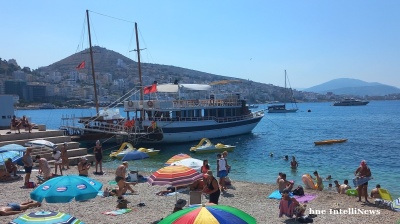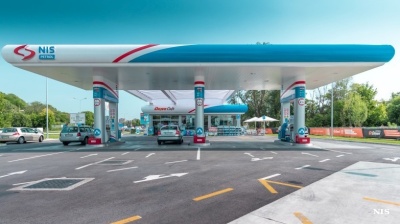The sudden exit of Western companies, because of sanctions, leaves the modernisation of the Russian electricity sector in the lurch.
Gas turbines may not be your usual breakfast fare (or mine – I like shredded wheat), but they’ve been in the headlines a lot lately. At the centre of the story is a gas pipeline called Nord Stream-1, which connects Russia to Germany under the Baltic Sea. It has become the centre of a power struggle between Russia and Europe, which will play out throughout the autumn and winter. Putin claims that the Europeans have failed to service a key gas turbine that powers the pipeline. But it is clear that he is attempting to use the turbine issue as blackmail, forcing Europe into making concessions on its sanctions.
Putin indeed has a gas turbine problem, but it is not the one he thinks. His more serious problem is that advanced gas turbines are at the heart of the Russian electricity sector, which drives the Russian economy. These depend on Western companies and Western technology, and the sanctions are already having a disruptive impact.
A modern gas turbine is one of the unsung wonders of the engineering world. The idea of a gas turbine seems pretty straightforward. A compressor generates a high-pressure stream of hot air; an injection of fuel sets the mixture alight; and the burning mixture turns a bladed turbine, which then generates electricity or provides thrust. What could be simpler? Indeed, gas turbines have been around for over a century, and they are used everywhere, in jet engines, gas pipelines, power plants, and even tanks.
The Russians are perfectly capable of making gas turbines. But these are only the smaller turbines that power gas pipelines or airplane engines. Russia has been unable to make the much larger turbines that are used in gas-fired power plants, which provide 80% of the power for the core of the Russian economy. The system still consists largely of backward Soviet-era equipment, which urgently needs modernisation. For this, Russia depends almost entirely on Western technology. How did this happen? Over the past twenty years, in Europe and the US, there has been a revolution in the design and fabrication of large gas turbines for power generation. Today’s turbines are far more powerful than their predecessors. They use more advanced materials, such as single-crystal turbine blades made of heat-resistant nickel-steel alloys, and as a result they operate at much higher temperatures and pressures, with correspondingly greater efficiency and reliability.
The greatest single breakthrough in the industry is the development of so-called “combined-cycle gas turbines,” or CCGTs, in which a gas turbine is coupled with a steam turbine, resulting in efficiencies of 60% or more, by far the highest of any power-generating technology. CCGT’s are the gold standard in the industry today.
But Russia largely missed out on this revolution. In the chaos that followed the Soviet collapse, little attention was paid to the modernisation of the power system. The network of research and engineering institutions that had supported turbine development in the Soviet Union dissolved, as funding disappeared, and they were sold off for their land and assets. But in the 1990s, this decay went largely unnoticed: natural gas was plentiful and cheap, and demand for power was stagnant.
Compounding the problem was that no one paid their power bills. Russia had degenerated into a barter economy; cash was scarce; and there was no way to shut off non-paying customers, who were allied with powerful regional governors. In this situation, there was no incentive to invest in new technology, and investors kept their distance, while the power system continued to decay.
But in 1998 Anatoly Chubais – famous (or notorious, take your pick) for being the “father of Russian privatization” – was named chairman of the Russian power monopoly, YeES Rossii. He tackled the broken system, and over the next ten years he brought about a revolution. His approach was taken straight out of the classic neoliberal playbook: He split the power monopoly into separate generating and distribution companies; he raised power tariffs; and he laid down strict new rules to force power consumers to pay their bills. In the newly-privatised “energos,” as they were called, a new generation of professional managers purged the Soviet-era electrical engineers. The new managers looked to their bottom line, and the energos became solvent.
In 1999-2000, thanks to rising oil prices, the Russian economy started growing again, and power demand abruptly turned around. But the capacity of the power system was continuing to decline, for lack of investment. Chubais went on a one-man campaign, warning that rising demand would soon exceed capacity, and that disaster lay ahead if the sector didn’t modernise. He became famous for a graphic, which came to be called “Chubais’s cross,” showing the curve of demand intersecting the curve of declining capacity, and which he showed to anyone who would listen. Chubais then used his power as head of RAO YeES to institute a bidding system to kick-start investment. An energo whose modernisation project was approved by RAO YeES could recover all of its capital costs and pass them on to consumers in the form of higher tariffs.
Initially the response was modest, until events came to Chubais’s rescue. In May 2005, a power outage left large parts of central Moscow in the dark, together with several cities in nearby provinces. Tens of thousands of people were trapped in the Moscow metro and in elevators, and parts of the government were put out of action. Over 2mn people were affected.
The blackout suddenly dramatised the decrepit condition of the power sector. The incident caught Putin’s attention, and overnight the message to the energos was: “Submit your investment project, and do it now. Money is no object, and order where you can.” In 2008 Chubais announced vast plans to invest $56bn by 2010 in new power systems, featuring 133 gas turbines and 146 steam turbines.
The Western companies come in to the power sector
It was a situation made to order for foreign suppliers. For the next decade and a half – right up to the time of the invasion of Ukraine – a handful of Western companies, led by General Electric of the US and Siemens of Germany, led the modernisation of the Russian electricity sector, especially focusing on the gas-fired power plants.
By the time of the Russian invasion, there were over 100 foreign gas turbines operating in Russian power stations. Most of these came from General Electric, which opened an office in Moscow as early as 2004. In 2014, it formed a joint venture with the Russian company InterRAO and was producing 14 gas turbines a year. By the end of 2021 General Electric had over 1,000 employees in Russia, and had sold over 1,000 gas turbines of all kinds, and over 800 aircraft engines.
GE’s only rival in Russia was Siemens. Its power subsidiary, Siemens Energy, formed a 65% joint venture with a Russian turbine manufacturer, “Silovye Mashiny,” part of a large conglomerate owned by a Russian oligarch, Alexey Mordashov. By 2018 two-thirds of the new gas-turbine capacity installed over that decade consisted of imported models from the two companies, while the remaining one-third came from production under licence, mainly from the joint venture between Siemens and “Silovye Mashiny.”
But the going soon gets tougher
Unfortunately, after the first five years or so, the Russian market turned sour – for three reasons: First, the global financial crisis of 2008-9 caused oil prices to collapse, and suddenly the Russian economic boom of 2000-2008 came to an end. Second, in the slowdown that followed, the expected tripling of electric demand never materialised. Suddenly there was little call for new generators, halting the modernisation of the gas-fired fleet. Third, as Russian-Western relations deteriorated, official pressure for “import substitution,” that is, sourcing from Russian manufacturers, increased. In 2017, the Ministry of Energy adopted a new tender system, which made Russian content mandatory.
Yet the Western turbine suppliers continued to make good money, right up to the time of the invasion, partly by servicing the existing foreign stock, and partly by supplying advanced components, such as turbine blades, which were all imported. And for the handful of new projects that remained, the foreign companies retained the inside track, since the Russian manufacturers did not have a large model to offer.
Russian companies made two attempts fight back. First, an alliance of three state companies developed an all-Russian model of a 110-MW gas turbine – Russia’s first, with the ambitious goal of delivering 40 MW of new installed capacity by 2031. But their first prototype in 2017 was an embarrassing failure, and since the invasion there has been no further mention of the 110-MW machine. The second attempt, by Mordashov’s “Silovye Mashiny”, successfully developed a 170-MW gas turbine, licensed from Siemens under the two companies’ joint venture. It successfully passed all tests and was due to start assembly in 2023. It had even lined up its first customer, in Tatarstan, after the Tatar president appealed personally to Putin to grant an exemption from import-substitution rules. However, after the invasion the agreement collapsed, as both sides backed away out of fear of sanctions.
In the weeks following the Russian invasion, General Electric and Siemens both suspended all new investments and announced their intention to leave Russia by the end of the year. Two other Western companies, Enel and Fortum/Uniper, which had taken majority positions in two Russian energos, likewise headed for the exit, as did Mitsubishi, which had set up a joint venture in eastern Russia. Thus overnight, two decades of the presence of Western companies in the Russian power sector came to an abrupt end.
Putin’s gas-turbine problem and the power of western sanctions
The key point of this story is that after 30 years of reform Russia ends up standing still in a key branch of industry. The lights won’t go out, but what those lights will continue to illuminate will be a technologically backward sector. The lack of advanced gas turbines will affect not only power generation, but also other applications, such as the large gas turbines needed for LNG projects and turbines needed for wind generation. It will take Russia a decade or more to catch up, by which time world gas-turbine technology will have moved on the next level of efficiency.
But this result is only partly due to the Western sanctions. As in other sectors of Russian industry, it is also due to two other factors – the inherited weakness of the Russian engineering sector (a legacy of the Soviet collapse and the chaos of the 1990s), plus the effect of misguided policies. The Russian government in the mid-2000s launched into a rushed modernisation programme, resulting in an extreme reliance on foreign technology, which in turn made the power sector vulnerable once the Western suppliers and partners withdrew. Then, starting in the mid-2010s, an overhasty reaction in the opposite direction, mandating all-Russian content, has locked the power sector into continued dependence on the backward Russian models. The result will be a “modernisation” that will be anything but modern.
But this is very far from a “collapse of the Russian economy,” as some studies of the impact of sanctions have claimed. That is because, at the same time, demand for electricity in the Russian economy is declining, and is likely to continue doing so for another decade. Moreover, natural gas will remain abundant and cheap, as declining gas exports are re-allocated to the domestic economy, especially the power sector. Thus the gas-fired generating sector will remain backward and inefficient, but it will be adequate to supply a diminished Russian economy. Putin’s “turbine problem” turns out to be manageable – Putin-style.
Thane Gustafson, a professor at Georgetown University, is the author and co-author of eight books on Russian affairs, including most recently Wheel of Fortune: the Battle for Oil and Power in Russia (2012), The Bridge: Natural Gas in a Redivided Europe (2020), and Klimat: Russia in the Age of Climate Change (2021), all with Harvard University Press.
This article first appeared on Gustafson’s substack “Devil’s Dance” here.
Features

CEE needs a new growth model as FDI plunges
wiiw economist Richard Grieveson says the CEE region’s long-standing model of attracting FDI through low labour costs no longer works.
KSE: Ukraine is facing a $53bn budget shortfall, but economy is stable for now
Ukraine is in urgent need of additional financing from partners as the continuation of the war drives up defence spending and reconstruction needs, jeopardizes budget financing, weighs on the balance of payments, and slows economic growth.

PANNIER: Ruling family’s ‘palace in the sky’ cruel sight for Turkmenistan’s poor souls down below
Photos posted of renovated Boeing by US makeover manager offer further insight into "ultra-luxurious" world enjoyed by Berdimuhamedovs.

Russia tax service targets Russian accounts in UAE
The Russian Federal Tax Service (FTS) has ramped up its scrutiny of Russian nationals holding accounts in the United Arab Emirates, following the effective implementation of automatic tax information exchange between the two countries.




